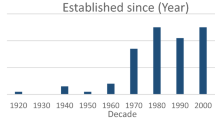Abstract
One important challenge in mathematics education is teaching modeling skills. We analyze the logs from a game-based learning system used in a massively multiplayer online tournament. Students had to detect an input–output pattern across 20 rounds. For each round, they received an input and had 2 minutes to predict the output by selecting a binary option (2 points if correct, −1 otherwise), or writing a model (4 points if model prediction was correct, −4 otherwise), or refraining (1 point). Thousands of 3rd to 10th grade students from hundreds of schools simultaneously played together on the web. We identified different types of players using cluster analysis. From 5th grade onwards, we found a cluster of students that wrote models with correct predictions. Half of the 7th to 10th grade students that detected patterns were able to express them with models. The analysis also shows diffusion within the teams of modeling strategies for simple patterns.
Similar content being viewed by others
References
Araya, R.: Inteligencia Matemática. Editorial Universitaria, Santiago (2000)
Araya, R.: Guess what is inside this box: look at these opened boxes for clues, Proceedings of the Fifth Congress of the European Society for Research in Mathematics Education Larnaca, Cyprus 22–26, p. 101–110 (2007)
Araya, R., Bahamondez, M., Jiménez, A., Calfucura, P., Dartnell, P., Soto-Andrade, J., Lacourly, N.: Estimación de Estrategias de Juego de Estudiantes en Torneo Masivo de Estadística. MATECOMPU 2009 La Enseñanza de la Matemática y la Computación, Matanzas, Cuba (2009)
Araya, R., Calfucura, P., Jiménez, A., Aguirre, C., Palavicino, M., Lacourly, N., Soto-Andrade, J., Dartnell, P.: The effect of analogies on learning to solve algebraic equations. Pedagogies: Int. J. 5(3), 216–232 (2010). Special Issue The teaching of Algebra
Araya, R., Jiménez, A., Bahamondez, M., Dartnell, P., Soto-Andrade, J., González, P., Calfucura, P.: Strategies used by students on a massively multiplayer online mathematics game. Lecture Notes in Computer Sciences, 7048. Advances in Web-based Learning - ICWL 2011. Springer Verlag (2011)
Bjorklund, D.: Why Youth is not Wasted on the Young. Immaturity in Human Development. Blackwell Publishing, Malden, MA (2007)
Bonk, C., Dennen, V.: Massive Multiplayer Online Gaming: A Research Framework for Military Training and Education http://www.adlnet.gov/SiteCollectionDocuments/archive/GameReport_Bonk_final.pdf (2005)
Burghardt, G.: The Genesis of Animal Play. MIT Press, Cambridge (2005)
Common Core State Standards: http://www.corestandards.org/the-standards/mathematics (2011)
Crawford, C.: On Game Design. New Riders, Indianapolis (2003)
Csikzentmihalyi, M., Abuhhamdeh, S., Nakamura, J.: Flow. In: Elliot, J., Dweck, C. (eds.) Handbook of Competence and Motivation. Guilford, New York (2005)
Delwiche, A.: Massively multiplayer online games (MMOs) in the new media classroom. Educ. Technol. Soc. 9(3), 160–172 (2006)
Devlin, K.: Learning mathematics in a commercially successful “Massively Multiplayer Online” Game. 2010 American Association for the Advancement of Science (AAAS) Annual Meeting. http://aaas.confex.com/aaas/2010/webprogram/Paper1103.html http://news.stanford.edu/news/2010/february15/devlin-aaas-mathematics-021910.html (2010)
Devlin, K.: Mathematics Education for a New Era: Video Games as a Medium for Learning. Natick, MA. A.K. Peters, Ltd. (2011)
Geary: The Origin of Mind. Evolution of Brain, Cognition, and General Intelligence. American Psychology Association, Washington, D.C (2005)
Geary: Educating the Evolved Mind: Conceptual Foundations for an Evolutionary Educational Psychology. Information Age Publishing, Charlotte (2007)
Hektner, J., Schmidt, J., Csikzentmihalyi, M.: Experience Sampling Method. Measuring the Quality of Everyday Life. Sage, Thousands Oak, CA (2007)
Ikeda, T.: Possibilities for, and obstacles to teaching applications and modelling in the lower secondary levels. In: Blum, W., Galbraith, P., Henn, H., Niss, M. (eds.) 2007, Modeling and Applications in Mathematics Education. Springer Verlag, New York (2007)
Li, Q., Lau, R., Shih, T., Li, F.: Technology supports for distributed and collaborative learning over the internet. ACM Trans. Internet Technol. 8(2), 10 (2008)
Liu, S., Liao, H., Pratt, J.: Impact of media richness and flow on e-learning technology acceptance. Comput. Educ. 52, 599–607 (2009)
OECD: PISA 2003 Assessment Framework: Mathematics, Reading, Science, and Problem Solving Knowledge and Skills. http://www.oecd.org/dataoecd/46/14/33694881.pdf (2003)
OECD: Assessing Scientific, Reading and Mathematical Literacy. A Framework for PISA 2006. http://www.oecd.org/dataoecd/63/35/37464175.pdf (2006)
Panksepp, J.: Affective Neuroscience. Oxford University Press, New York (1998)
Pearce, C., Fullerton, T., Fron, J., Morie, J.F.: “Sustainable play: toward a new games movement for the digital age.” Games and Culture, 2(3), 261–278. (2007) http://www.lcc.gatech.edu/~cpearce3/PearcePubs/DACSustainablePlay.pdf
Pellegrini, A.: The Role of Play in Human Development. Oxford University Press, New York (2009)
Mayfield, K., Chase, P.: The effects of cumulative practice on mathematics problem solving. J Appl Behav Anal 35, 105–123 (2002)
Moller, A., Meier, B., Wall, R.: Developing an experimental induction of flow: effortless action in the lab. In: Buya, B. (ed.) Effortless Attention: A New Perspective in the Cognitive Science of Attention and Action. MIT Press, Cambridge (2010)
Nasa: Development of a NASA-Based massively multiplayer online learning game http://www.spaceref.com/news/viewsr.html?pid=26717 (2008)
Nasa: Nasa MMO Game http://ipp.gsfc.nasa.gov/mmo/ (2009)
National Mathematics Advisory Panel: The Final Report. U.S. Department of Education. (2008)
Ramamohanarao, K., Fan, H.: Patterns based classifiers. World Wide Web. 10, 71–83 (2007)
Salem, K., Zimmermann, E.: Rules of Play: Game Design Fundamentals. MIT Press, Cambridge (2004)
Siegler, R.: Emerging Minds. The Process of Change in Children’s Thinking. Oxford University Press, New York (1996)
Siegler, R.S., Araya, R.: A computational model of conscious and unconscious strategy discovery. In: Kail, R.V. (ed.) Advances in Child Development and Behavior, vol. 33, pp. 1–42. Elsevier, Oxford, UK (2005)
Steinkuehler, C.: Massively multiplayer online games & education: an outline of research. Proceedings of the 8th international conference on Computer supported collaborative learning. http://portal.acm.org/citation.cfm?id=1599726 (2007)
Tabula Digita DimensionM: Tabula Digita Video Games Add Up Fast: One Million Dimensionm Games Played By Math Students http://cache.dimensionm.com/qa/newspdfs/1%20Million%20Games%20NR%20FINAL.pdf, http://www.dimensionu.com/math/ (2010)
van der Maas, H., Straatemeier, M.: How to detect cognitive strategies: commentary on ‘Differentiation and integration: guiding principles for analyzing cognitive change. Dev. Sci. (2008)
Author information
Authors and Affiliations
Corresponding author
Rights and permissions
About this article
Cite this article
Araya, R., Jiménez, A., Bahamondez, M. et al. Teaching modeling skills using a massively multiplayer online mathematics game. World Wide Web 17, 213–227 (2014). https://doi.org/10.1007/s11280-012-0173-5
Received:
Revised:
Accepted:
Published:
Issue Date:
DOI: https://doi.org/10.1007/s11280-012-0173-5




